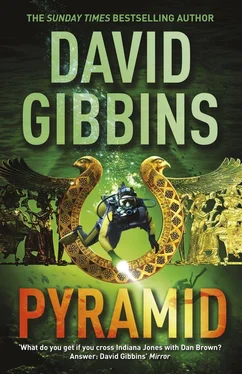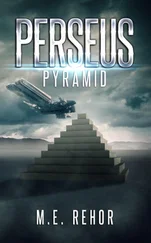Costas was peering closely at the edge of the sarcophagus near the feet. “Fascinating,” he said. “The lid was originally sealed over with sheet gold, but then someone’s been around and scored it, cutting through to the crack between the sarcophagus and the lid. It’s been pushed slightly off center.”
Jack knelt down beside him, staring. “Corporal Jones again?”
“Maybe when he got hungry,” Costa suggested. “Before he found those other mummies.”
Jack heaved on the lid, suddenly feeling woozy as he did so, his heart pounding and his chest tight. He knew they were more than halfway through Costas’ predicted countdown before the oxygen level became critical. He pushed again, creating a crack just large enough for him to aim his beam inside. He panned it around, and then looked again. “I think Jones would have been disappointed. There’s nothing inside.”
“Ancient tomb robbers?”
Jack shook his head. “There’s no evidence I can see for robbers ever having gotten inside this chamber. When it was sealed up, that was it for over two thousand years. Ancient robbers would always leave the worthless debris behind, the mummy wrapping and bones, and they’d never have left without hacking off those parts of the sarcophagus that look like solid gold — the hand, the ears, the beard. No, this was empty from the outset.”
“Well, if Akhenaten could pull the wool over the Egyptians’ eyes about the real cause of the loss of an entire chariot army in the Red Sea, then I guess he could fake his own death.”
Jack stared at the face on the sarcophagus. It was Akhenaten as nobody had seen him before: not the elongated, misshapen pharaoh with the masklike visage, exaggerating his otherness, but instead Akhenaten the man, a fitting consort to the Nefertiti whose face had transfixed Jack a week before in the Cairo Museum. This was Akhenaten not as the world would know him but as he wished to be seen in the place of his greatest legacy, presiding not as a pharaoh but as a man over a treasure far greater than any of the riches that filled the tombs of his ancestors.
“Jack, take a look at what I’ve just found. These definitely aren’t ancient.”
Costas had followed one of the ridges to the edge of the chamber between the alcoves filled with jars, and was squatting down. Jack walked over and joined him. On a ledge in front of the wall were two tarnished medals, their ribbons faded and dirty but laid out as if they had been carefully arranged. Jack recognized them immediately as Victorian campaign medals. One was silver, showing the Sphinx with the word Egypt above and the date 1882 below, its ribbon made up of three blue and two white stripes. The other was a five-pointed bronze star with the Sphinx and the three pyramids in the center, also inscribed Egypt and 1882 but with the year in Arabic in the Muslim calendar at the foot and surmounted by a star and crescent. Jack carefully picked up the silver medal, wiped the rim, and inspected it closely. “Well, I’ll be damned,” he said quietly. “It’s our friend 3453 Corporal R. Jones, Royal Engineers. We meet at last.”
Costas picked up the star. “How did he get these if he’d basically deserted?”
“Look at the date, 1882,” Jack replied. “After Jeremy found that account in Howard Carter’s diary, he looked up Jones’ service record in the National Archives. It lists him as missing in action after the Battle of Kirkeban in February 1885, presumed killed. But it also shows that he’d first arrived in Egypt from India in 1882 as part of the expeditionary force sent to support the Khedive against an army uprising, but that soon became embroiled in the war against the Mahdi. So Jones had already had these two medals, the Egypt Medal and the Khedive’s Star.”
Costas examined the star, fingering the crescent on the clasp. “Ironic that British soldiers for years to come would have worn the symbol of Islam and the caliphate on their chests, after having fought a war that many would have seen as a latter-day crusade against the jihad.”
Jack put the Egypt Medal back, carefully laying the ribbon as he had found it. “That’s history for you. Never quite what it seems. Officially the British were fighting for the Khedive of Egypt and the Ottoman Empire, the largest Islamic state the world has ever seen. And some among the officers, particularly those who had spent years in the Arab world, were sympathetic to aspects of Islam. Gordon and the Mahdi would have been an interesting meeting of minds, philosophically not that far apart.”
“Well, it’s pretty clear where Jones was coming from,” Costas said, pointing to the wall just to the right of the shelf with the medals. “Take a look at that.”
Jack shifted around and stared. The lower part of the wall was covered in an inscription, written in the neat, precise hand taught to all Victorian schoolchildren, with the subject matter that was often their sole source of simile and metaphor. Jack slowly read it out loud: “ ‘Yea, though I walk through the valley of the shadow of death, I will fear no evil; for thou art with me; thy rod and thy staff they comfort me.’ ”
“ ‘I will dwell in the house of the Lord forever,’ ” Costas murmured. “The Twenty-third Psalm. He must have been awestruck by the appearance of the pharaoh, by the crossed rod and staff on the sarcophagus. Those medals with their images of the sphinx and the pyramids must have seemed like offerings to him, meant for this place.”
Jack took a few steps farther toward the open tunnel heading in the direction of Cairo, stepping over fragments of plaster that Jones must have dug out of the wall over the days it probably took him to open it up. Beneath the plaster he saw something else, a skeletal form. He stared at it and then gestured to Costas. “I think we might just have solved another mystery.”
Costas came over and then stopped abruptly. “I see bones. Don’t tell me. Not Jones’ final mummy feast.”
Jack shook his head. “This is the skeleton of someone who has lain down to die, or been placed in this position. Look at what he’s holding. It’s a little Arab dagger, beautifully engraved on the blade and embellished with gold. I think this is where Jones got his souvenir, that ring.”
“Caliph Al-Hakim bi-Amr Allah,” Costas murmured. “We knew he’d be in here somewhere. Do you think he was trying to escape too? Do you think Jones found his body, and then laid him out like this?”
Jack stared at the skeleton. “The medieval accounts suggest that he went alone at night into the desert on many occasions before disappearing for good, clearly faking his own death. I think after finding that entrance we passed in the tunnel, the partly collapsed ventilation shaft, and exploring this place, he eventually found the light shaft we came through and got into this chamber. Maybe seeing the sarcophagus did it for him, and he decided next time to come in here for good, never to go back.”
Costas sifted the dust on top of the bones. “Maybe he had delusions of grandeur. He could have been the one who tried to open the sarcophagus, not Jones. Look at the way he’s lying, with his arms crossed like that. Maybe he wanted to lie down inside the sarcophagus, to be Akhenaten.”
“Being a caliph was not that much different from being a pharaoh,” Jack murmured. “And Akhenaten isn’t the only ruler in history to want to get away from it all.”
Costas peered down where he had been sifting. “Look at this, Jack. He’s got something in his hands. It’s a small wooden frame containing a piece of papyrus, with text in hieroglyphs.”
Jack knelt down and peered at it, feeling a sudden rush of satisfaction. He had found his piece of text . “I don’t know what it is,” he said. “But it must have some special significance to have been framed like that. Let’s make sure we both have detailed images.”
Читать дальше












